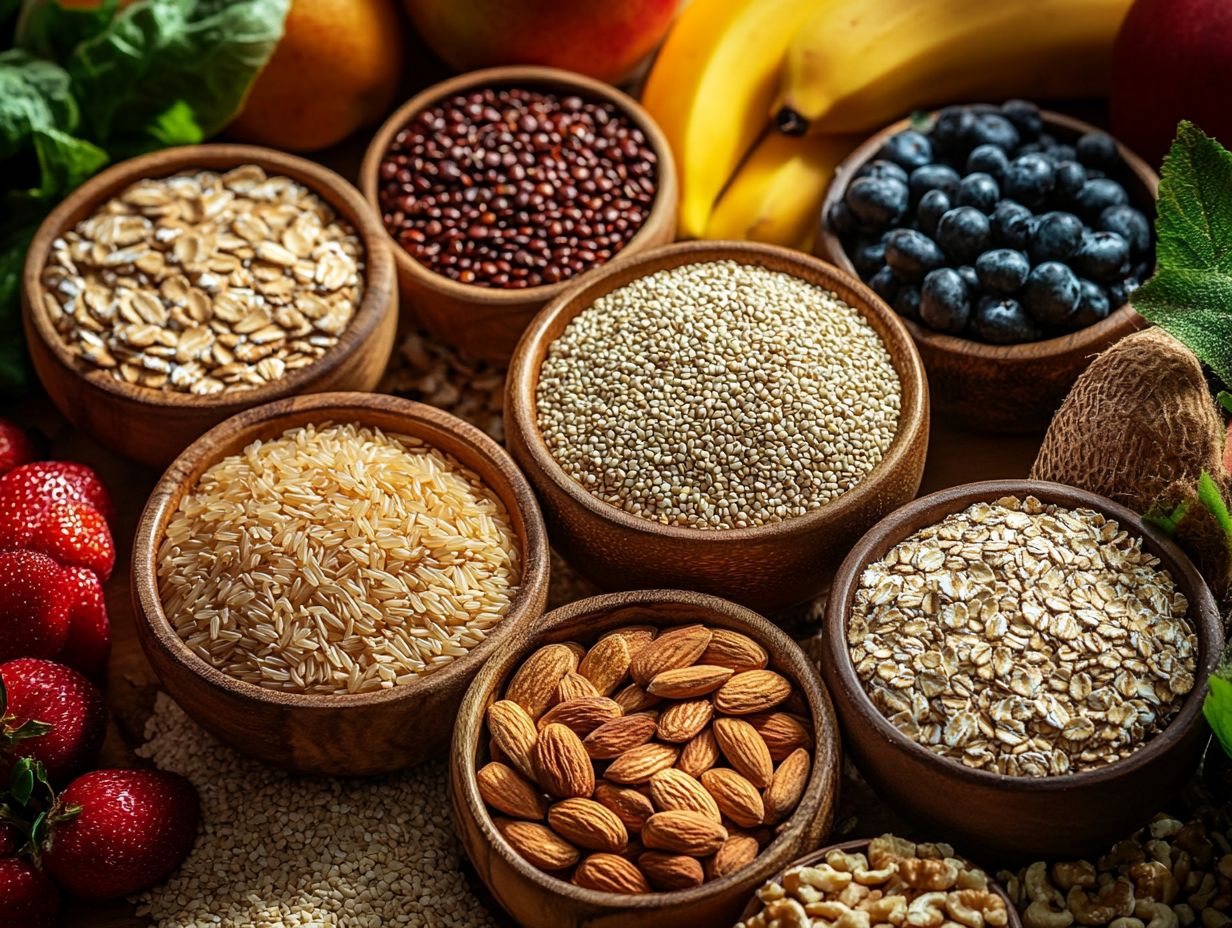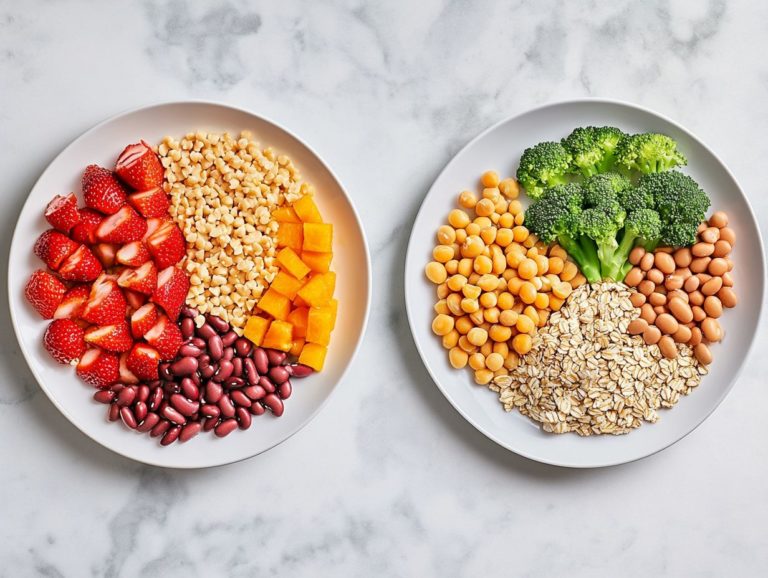Why You Should Love Whole Grains: Top Benefits
Whole grains often find themselves sidelined in your diet, overshadowed by their refined counterparts and processed foods.
However, these nutritional powerhouses provide a wealth of benefits that can significantly enhance your health and well-being. With essential vitamins and minerals, plus dietary fiber that promotes digestive health, whole grains play a pivotal role in disease prevention and effective weight management.
Dive into the advantages of incorporating whole grains into your meals. Discover practical tips for selecting and preparing them. Consider these key tips as you make this exciting transition!
Embrace the goodness of whole grains, and unlock the potential they hold for transforming your diet!
Contents
- Key Takeaways:
- Nutritional Benefits of Whole Grains
- Health Benefits of Whole Grains
- Incorporating Whole Grains into Your Diet
- Potential Risks and Considerations
- Frequently Asked Questions
- What are the top benefits of incorporating whole grains into your diet?
- Why should I choose whole grains over refined grains?
- How do whole grains help with weight management?
- What nutrients do whole grains provide?
- Can whole grains help prevent chronic diseases?
- How can I incorporate more whole grains into my diet?
Key Takeaways:

- Whole grains are packed with essential vitamins and minerals, making them a nutritious addition to any diet.
- Incorporating whole grains can help reduce the risk of chronic diseases and improve weight management.
- When choosing and preparing whole grains, consider allergies and intolerances, and practice portion control for optimal health benefits.
What are Whole Grains?
Whole grains represent the entire seed of a plant, encompassing three vital parts: the bran, germ, and endosperm. They are essential for a healthy diet, offering numerous health benefits that refined grains simply cannot match. Refined grains, processed by industrial roller mills, lose key nutrients along the way. Think of whole grains like brown rice, quinoa, and wheat nutrient-dense powerhouses that remain intact.
Unlike refined grains, which consist solely of the endosperm after discarding the nutrient-rich bran and germ, whole grains retain all three critical components. This makes them a nutritional powerhouse, packed with fiber, B vitamins, antioxidants, and minerals such as iron and magnesium. These nutrients not only contribute to overall health but also help in preventing chronic diseases.
Incorporating whole grains into your diet can enhance digestive health, help regulate blood sugar levels, and support weight management. By opting for whole grains over their refined counterparts, you can markedly improve your nutritional intake and bolster your long-term well-being.
Nutritional Benefits of Whole Grains
The nutritional benefits of whole grains are truly remarkable. They offer essential minerals such as magnesium and selenium, along with dietary fiber that plays a crucial role in maintaining gut health and supporting your overall well-being.
By incorporating whole grains into your diet, you align yourself with dietary guidelines that highlight their importance in achieving a balanced and healthful lifestyle.
Essential Vitamins and Minerals
Whole grain foods are a treasure trove of essential vitamins and minerals, particularly B vitamins, antioxidants, magnesium, and selenium, all of which significantly enhance your overall health and wellness.
These nutrients serve critical roles in your body. For example, B vitamins like thiamin, riboflavin, and niacin are critical for energy metabolism, helping you convert food into usable energy every hour of the day. Antioxidants present in whole grains work tirelessly to combat damage from free radicals, potentially lowering your risk of chronic diseases. Meanwhile, magnesium is your ally in supporting muscle and nerve function, and selenium plays a key role in maintaining a robust immune system.
The fiber in whole grains is a boon for your digestive health, helping to regulate blood sugar levels and promoting heart health by lowering cholesterol. By incorporating these nutrient-rich foods into your diet, you not only boost your nutrient intake but also enhance your overall vitality.
Start your journey to a healthier you by adding whole grains to your next meal!
Dietary Fiber and Digestive Health
High dietary fiber intake from fiber-rich foods like whole grains is crucial for your digestive health. It encourages the growth of beneficial gut bacteria and helps reduce inflammation.
Think of fiber as a broom that sweeps through your intestines, preventing constipation while nurturing your microbiome. A fiber-rich diet lowers your risk of chronic diseases, including heart disease and type 2 diabetes.
By including a variety of fiber sources like legumes, fruits, and vegetables you’ll enjoy a wealth of health benefits while enhancing your well-being.
Health Benefits of Whole Grains

You ll find that the health benefits of whole grains are extensive. Incorporating them into your diet can significantly reduce your risk of chronic diseases, including heart disease, type 2 diabetes, and colorectal cancer.
Eating whole grains improves your diet and overall wellness, making whole grains an essential part of a balanced lifestyle.
Reduced Risk of Chronic Diseases
Incorporating whole grains into your diet can dramatically reduce your risk of developing chronic diseases like heart disease and type 2 diabetes. Numerous health studies have established a clear link between whole grain consumption and improved health outcomes.
For example, the Iowa Women s Health Study found that women who consumed more whole grains enjoyed a lower risk of heart disease and improved cardiovascular health. Similarly, the Nurses Health Study revealed that those who regularly included whole grains in their meals faced lower rates of type 2 diabetes and metabolic syndrome.
You should make whole grains a key part of your daily meals. Packed with fiber, antioxidants, and essential nutrients, whole grains promote better health and longevity.
Improved Weight Management
Whole grains can significantly enhance your weight management efforts by boosting your dietary fiber intake. This not only aids in regulating cholesterol levels but also improves insulin sensitivity, leading to better overall body health.
Numerous studies suggest that when you embrace a fiber-rich diet especially one abundant in whole grains you re likely to experience a reduction in appetite and a heightened sense of fullness.
This satiety effect can substantially lower your overall caloric intake, which is crucial for effective weight control.
Research published in the American Journal of Clinical Nutrition underscores the role of whole grains in fostering healthy gut bacteria, vital players in body processes. These microorganisms help break down fiber and potentially influence how your body stores fat and regulates blood sugar levels.
Incorporating fiber-rich foods into your daily meals is essential for optimal health and weight management.
Incorporating Whole Grains into Your Diet
Start incorporating whole grains today for a healthier, happier you! As you explore a diverse range of whole grain products and alternatives, look for items adorned with the whole grain stamp on the ingredient list.
This stamp assures you of their healthy ingredients, guiding you toward choices that enhance your culinary experience.
Tips for Choosing and Preparing Whole Grains
When selecting and preparing whole grains, focus on choosing healthful options that align with your dietary preferences.
Explore various cooking methods and integrate these grains into your meals. This will elevate your whole grain intake.
Incorporating choices like quinoa, farro, or bulgur can introduce delightful variety and enhance nutritional benefits. These grains provide essential vitamins, minerals, and fiber.
Soaking grains such as brown rice or barley before cooking reduces cooking time and improves digestibility. Sprouting grains can boost nutrient availability and enhance their flavor.
By experimenting with these techniques, you can create wholesome dishes that align with your health goals. This makes it easier to enjoy the benefits whole grains offer while diversifying your culinary repertoire.
Potential Risks and Considerations

While whole grains provide remarkable health benefits, consider potential risks, especially if you have allergies or intolerances.
Conditions like gluten sensitivity can lead to serious issues, such as Crohn s disease and ulcerative colitis. Being aware of these factors helps you make informed choices for your health.
Allergies and Intolerances
Navigating whole grains can be challenging if you have gluten allergies or intolerances. Choosing gluten-free alternatives is crucial for your health!
This situation can lead to frustration, especially when your go-to options are off the table. However, nutritious whole grain choices cater to your needs while avoiding gluten. Consider options such as:
- Quinoa
- Brown rice
- Buckwheat
These alternatives satisfy your craving for grains and deliver essential nutrients and fiber.
Cultivating the habit of reading ingredient lists is vital, as even trace amounts of gluten can cause discomfort. Being aware of hidden gluten sources like certain sauces and processed foods gives you the power to make informed dietary decisions and enjoy a satisfying gluten-free lifestyle.
Portion Control and Moderation
Maintaining portion control and moderation is essential when incorporating whole grains into your diet. Excessive consumption can lead to an imbalance in carbohydrate quality and impact your overall health.
To ensure whole grains enhance your meals, use measuring cups or a food scale. These tools help you understand proper serving sizes.
It s also wise to fill half of your plate with vegetables and other nutrient-dense foods, allowing whole grains to complement rather than overshadow your meal.
Exploring various whole grains, like quinoa, farro, and brown rice, keeps your meals exciting and encourages mindful eating.
Remember, the goal is to nourish your body without overwhelming it with excess carbohydrates.
Frequently Asked Questions
What are the top benefits of incorporating whole grains into your diet?
Whole grains are packed with nutrients and offer health benefits, such as improved digestion, weight management, and reduced risk of chronic diseases like heart disease and type 2 diabetes.
Why should I choose whole grains over refined grains?

Whole grains contain the entire grain kernel, including the bran, endosperm, and germ, while refined grains only include the endosperm. This means whole grains are higher in fiber, vitamins, minerals, and phytochemicals, making them a more nutritious choice.
How do whole grains help with weight management?
Whole grains are rich in fiber, which helps you feel fuller for longer and reduces the chances of overeating. The slow digestion of whole grains stabilizes blood sugar levels and keeps cravings at bay.
What nutrients do whole grains provide?
Whole grains are packed with fiber, B vitamins, folate, and essential minerals like iron, magnesium, and potassium.
These nutrients support overall health, from boosting energy to strengthening your immune system.
Can whole grains help prevent chronic diseases?
Yes! A diet rich in whole grains can reduce the risk of heart disease, stroke, type 2 diabetes, and certain cancers.
The secret lies in the high levels of antioxidants and fiber they contain.
How can I incorporate more whole grains into my diet?
Kickstart your journey by swapping refined grains for nutritious whole grains. Choose whole wheat bread over white bread and brown rice instead of white rice.
Don t forget about snacks! Opt for whole grain crackers or popcorn instead of chips for a healthier option.





